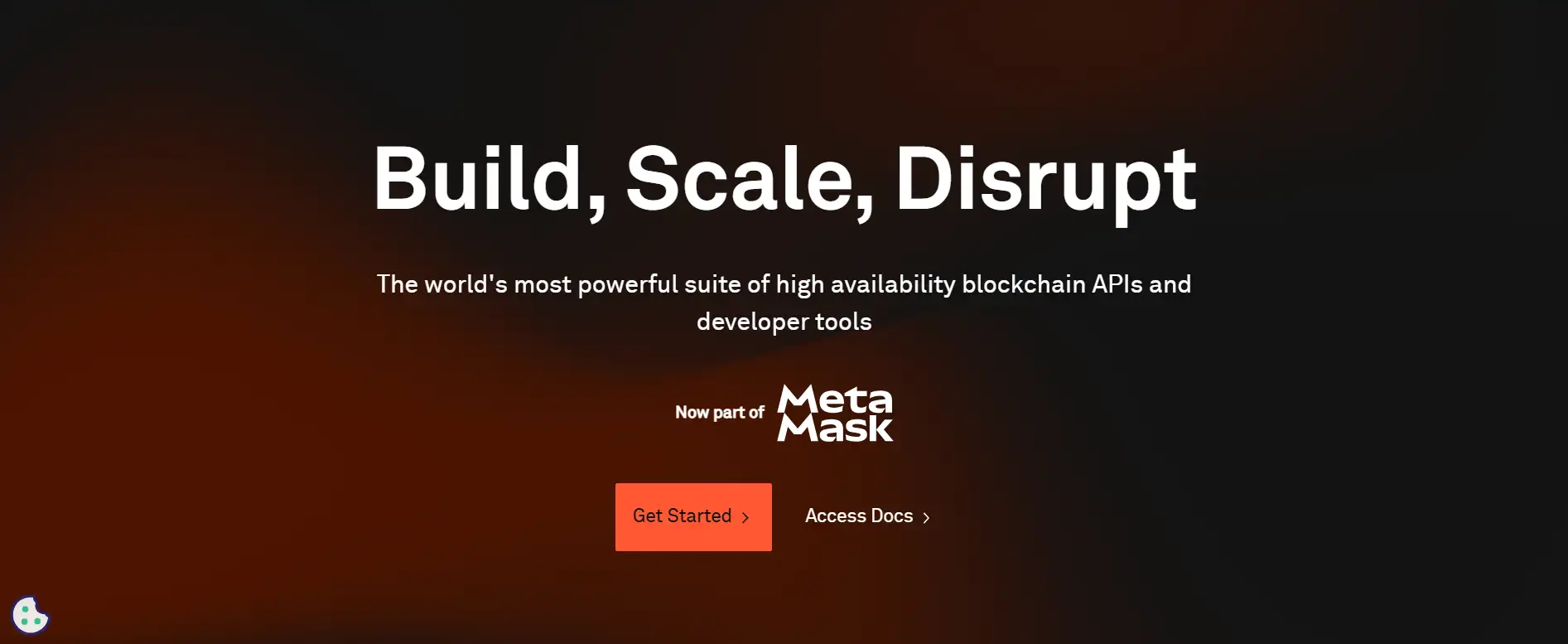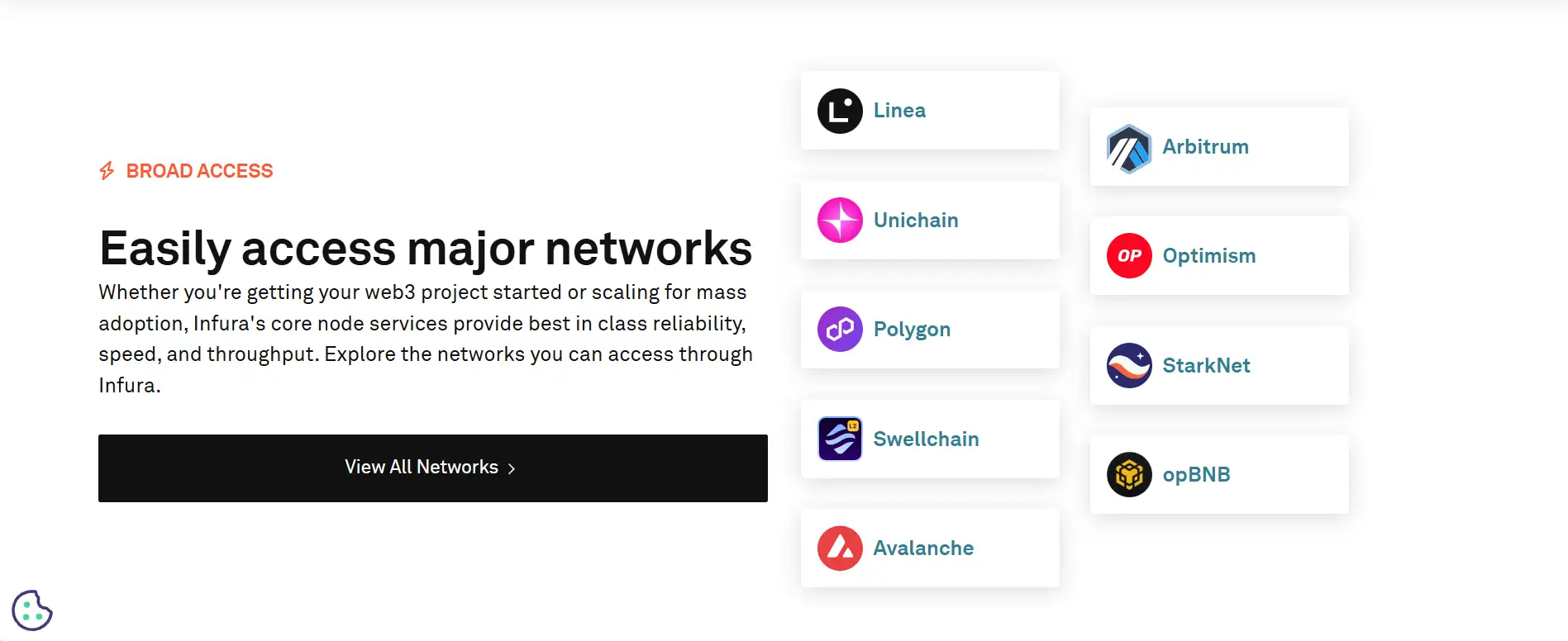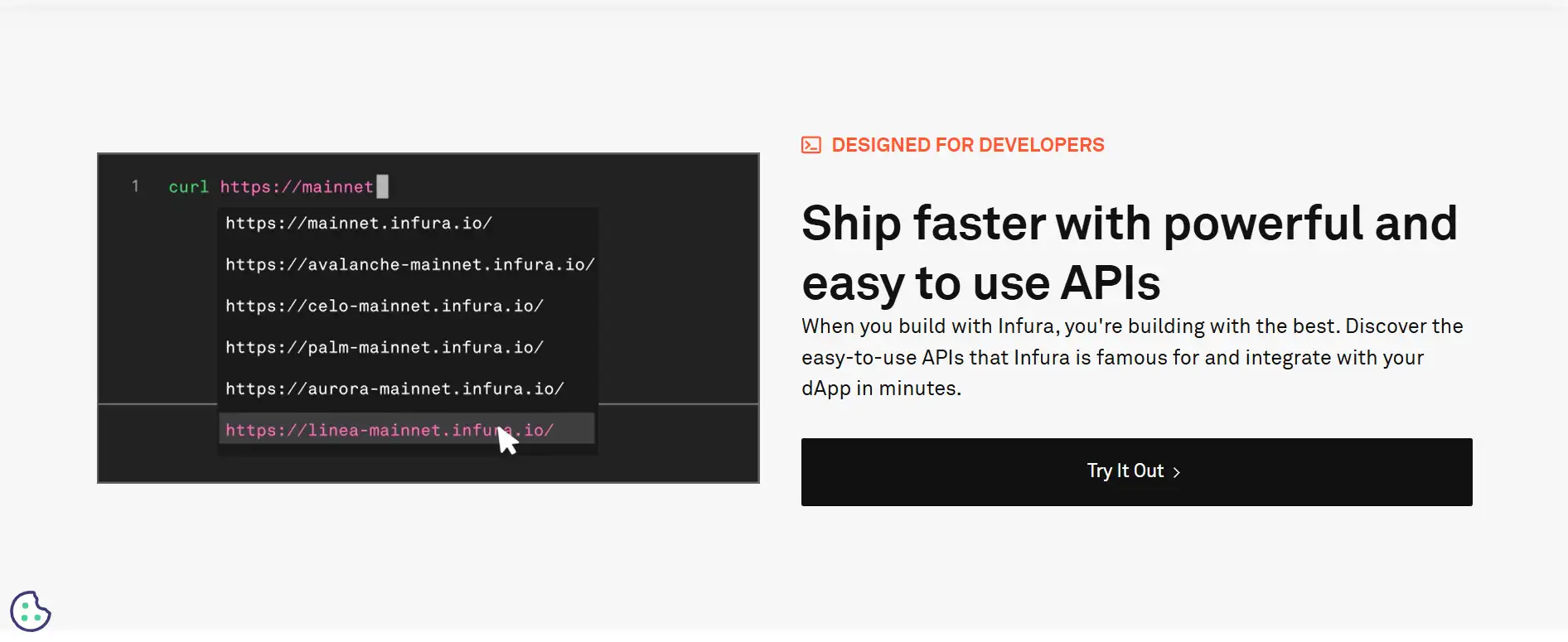About Infura
Infura is a powerful and developer-centric blockchain infrastructure platform created by ConsenSys. It enables builders to easily connect to decentralized networks without the operational complexity of running their own nodes. Through its high-availability APIs, Infura supports a wide range of blockchain projects by offering secure, scalable, and lightning-fast access to protocols such as Ethereum, Polygon, Arbitrum, Optimism, and StarkNet.
Designed with both startups and enterprises in mind, Infura powers some of the most widely used decentralized applications and wallets in Web3, including MetaMask, Uniswap, and Brave. It plays a foundational role in the growth and stability of the decentralized ecosystem, helping developers quickly launch dApps, manage network interactions, and scale effortlessly. Its integration with the MetaMask SDK and new initiatives like the Decentralized Infrastructure Network (DIN) underscore its commitment to innovation and decentralization.
Infura was launched in 2016 by ConsenSys to address a major pain point in blockchain development—running and maintaining full blockchain nodes. At the time, developers were forced to sync their own Ethereum nodes, a process that was both time-consuming and expensive. Infura abstracted this burden by providing high-availability APIs that allowed instant, scalable access to the Ethereum network. Since then, it has evolved into a comprehensive infrastructure suite that now supports a multitude of networks including IPFS, Filecoin, Polygon, Avalanche, Arbitrum, Optimism, StarkNet, Linea, and opBNB.
Infura’s infrastructure is trusted by industry leaders like MetaMask, which uses Infura’s Ethereum endpoints by default, and Uniswap, which relies on Infura to maintain consistent performance under heavy usage. The platform’s architecture offers developers faster response times—up to 20x faster than self-hosted solutions—and eliminates the need for full-time DevOps teams. This has made Infura a preferred partner for projects scaling from prototype to production.
Infura is now pioneering decentralization of its RPC infrastructure through its flagship initiative, the Decentralized Infrastructure Network (DIN). This project brings together centralized and decentralized providers to build a more robust, censorship-resistant network layer. DIN is a significant step toward mitigating single points of failure in blockchain infrastructure, reinforcing the ethos of the decentralized web.
The platform faces competition from services like Alchemy, QuickNode, and Chainstack, all of which offer similar node access and developer tooling. However, Infura maintains a competitive edge through its long-standing ecosystem integration, superior reliability, and native support within the broader ConsenSys product family.
Today, Infura continues to support thousands of decentralized applications, offering developers a fast and easy way to access blockchain data, deploy smart contracts, and interact with the decentralized web at scale. Its roadmap is firmly focused on decentralization, performance, and expanding multi-chain support—positioning it as a cornerstone of Web3 development infrastructure.
Infura provides numerous benefits and features that make it a standout project in the blockchain infrastructure landscape:
- High-Performance APIs: Connect to Ethereum and other networks instantly with Infura’s optimized RPC and WebSocket endpoints.
- Multi-Network Support: Developers can access major blockchain protocols including Ethereum, Linea, Polygon, Filecoin, Avalanche, Arbitrum, Optimism, StarkNet, and opBNB.
- Decentralized Infrastructure Network (DIN): A long-term initiative to decentralize RPC infrastructure and eliminate single points of failure.
- Developer-First Tooling: Infura offers an intuitive dashboard, SDKs, analytics, and extensive documentation, making it ideal for developers at any level.
- Scalable Pricing: Whether you're building a simple dApp or a large-scale protocol, Infura has free and paid tiers tailored for every stage of growth.
- Backed by ConsenSys: Seamless integrations with products like MetaMask and Codefi allow developers to build more powerful applications using the ConsenSys ecosystem.
Infura offers a fast and intuitive onboarding process for developers eager to start building on Web3:
- Create an Account: Go to the Infura signup page and create your account using your email.
- Set Up a Project: After logging in, set up your first project. Each project generates unique API credentials that let you monitor usage and manage security.
- Choose a Network: Select a supported blockchain like Ethereum, Polygon, Arbitrum, or Optimism, and copy the relevant RPC or WebSocket endpoint.
- Integrate with Your App: Use the endpoint within your frontend or backend app via your preferred Web3 library such as web3.js, ethers.js, or wagmi.
- Test and Deploy: Use Infura’s built-in monitoring tools and analytics dashboard to optimize requests, handle errors, and improve app performance.
- Use Developer Resources: Visit the Infura Help Center and Infura documentation to find extensive tutorials, FAQs, and troubleshooting guides.
Infura FAQ
Infura is built to scale with demand and has proven infrastructure capable of handling high-volume traffic events like NFT minting drops or major DeFi protocol launches. By operating a global architecture of high-throughput nodes, Infura minimizes latency and ensures request reliability even during blockchain congestion. This means developers don’t need to worry about outages when user activity surges — Infura’s system dynamically scales based on request load, ensuring mission-critical apps stay online.
Infura enables seamless access to its APIs via MetaMask Snaps, empowering developers to build custom dApp features directly within the MetaMask wallet. This reduces context switching, speeds up development cycles, and allows access to Infura’s multi-network support from within user wallets. By leveraging Snaps, developers can inject custom logic, RPC requests, and even integrate with non-EVM networks, all while relying on Infura’s backend for performance and security.
The Decentralized Infrastructure Network (DIN) is Infura’s initiative to decentralize the Web3 RPC layer. This helps reduce reliance on any single provider and increases resilience, fault tolerance, and censorship resistance. DIN is designed as a federation of centralized and decentralized node operators working together to serve requests. By participating in DIN, Infura enhances its infrastructure transparency and moves toward a more decentralized Web3 backend, mitigating a key concern around RPC monopolies.
Yes, Infura supports hybrid blockchain infrastructure models, allowing developers to use their own nodes alongside Infura’s APIs. This provides the best of both worlds: local control and flexibility from self-hosted nodes, with the stability and redundancy of Infura’s global infrastructure. Many teams use this model to validate transactions independently while ensuring uptime with Infura during traffic spikes or node downtime.
Infura removes the need for dedicated DevOps resources by abstracting the complexity of node management. For projects transitioning from testnet to mainnet, this means no hardware provisioning, no manual syncing, and no worries about maintaining uptime. Developers can scale infrastructure needs with a simple API tier change. With plans starting at zero cost and options to scale into enterprise-grade support, Infura helps projects reduce both time-to-market and ongoing operational expenses.
You Might Also Like












